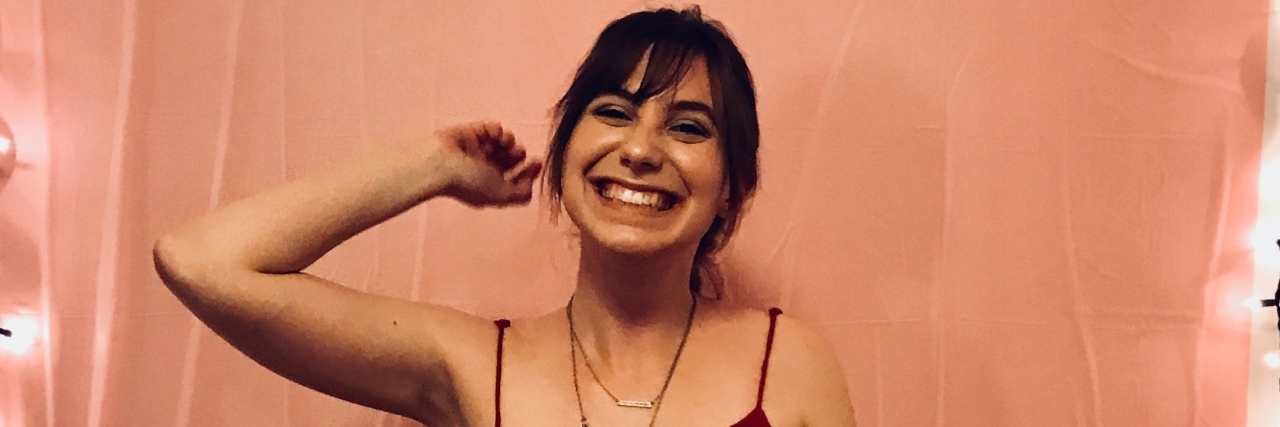My family moved two summers ago, and in the process we went through so much clutter trying decide what had sentimental value and what was trash. Among the piles, my mom found an old sheet of paper I had drawn up when I was only 3 – a petition trying garner signatures to change the legal voting age to 16. Apparently my logic was that if someone can drive a car at 16, then they should also be able to vote at sixteen. My mom laughed, saying that it was so typical of me to have played house and senate instead of traditional house.
Flash forward: I’m now 19 years old, studying political communications with an intended minor of women’s, gender, and sexuality studies at George Washington University – and as of Tuesday, April 24th, it became official that I never will play traditional house.
The inability to get pregnant was a loss I’d grieved long ago when I first got sick and realized that it wouldn’t be safe. I’ve known for years that in order to have children I’d have to go an untraditional route and that is something I’ve made peace with. Getting an endometrial ablation (a surgery that destroys the lining of the uterus to prevent bleeding during future periods) was just the nail in the coffin.
My world turned upside down when I had an injury before my 10th birthday. Something had always been kind of off, like little things — but nothing that made my parents too concerned. But this injury served as the straw that broke the camel’s back for underlying genetic conditions. When explaining my medical history, I like to say that my body is an oxymoron. I have a rare platelet disorder that causes excess bleeding and easy bruising, yet two years ago I began showing symptoms of a vascular disease requiring me to be on blood thinners due to clotting.
The impacts this combination has on my period are catastrophic. In the past I’ve ended up in the intensive care unit needing transfusions and even had to withdraw from my second semester of freshman year because of sheer blood loss, and it’s ever so pleasant side effects including the inability to stay conscious. I can’t take hormonal birth control because of increased risk of clotting — nor any other medications to slow the bleeding down. Every month before my period I would have panic attacks because I was terrified by the very real possibility that I could die. I was desperate to find a solution, any solution, that would give me back both quantity and quality of life.
Naively, I thought people would be nothing but supportive. I assumed they’d be empathetic to the severity of my situation, but that wasn’t the case. I was instead met with ridicule and contempt. I had physicians tell me things like, “But that’ll make it harder to find a husband,” and, “You’re too young to make this kind of decision.” I had people I once considered friends and strangers from social media saying things like, “You’re a selfish monster,” and “You’re going against God’s will!”
First of all, who says I even want to get married? And if I do, I’m not going to settle for anything less than a man who is unconditionally supportive of my medical journey. Second, well, that’s not exactly wrong — I am too young to have to make this kind of decision — but, guess what? Kids shouldn’t die from cancer, people shouldn’t have undrinkable water, and war shouldn’t exist, yet here we are. Third, valuing my life above the hypothetical lives of my unborn children does not make me selfish, nor a monster. And finally, fourth, nowhere in any religious text does it say that the only way to live out God’s plan is by getting pregnant.
This is my body; it does not belong to ignorant physicians, nor to some potential husband, nor to pseudo-supportive friends, and definitely not to strangers on the internet. It is mine and mine alone, which means what I do with it is my choice.
The stigma surrounding women who either decide not to or are unable to get pregnant is a horrible, toxic holdover from patriarchal values that should have been shut down long ago.
Instead of criticizing women forced into positions like mine, I beg that you support them. Remind them that they are beautiful, valid, still lovable, and damn sure no less of a woman simply for not being able to bare children. Tell them how the courage needed in making this decision is immeasurable. Respect their right to autonomy.
But never, under any circumstance, question or attempt to guilt us, because I guarantee we’ve already done enough of that on our own.
The choice to have an ablation was by no means easy, but the right choices never are, and I know beyond a shadow of a doubt that this decision was the right one for me.
After my journey fighting for adequate reproductive care I realized the severe lack of education, awareness, and discussion surrounding sexuality – especially in the chronic illness/disability community. To combat this, my organization, Sick Chicks, is hosting our first Sisterhood & Sexuality Summit on August 4th, at Saddleback College in Orange County, California.

